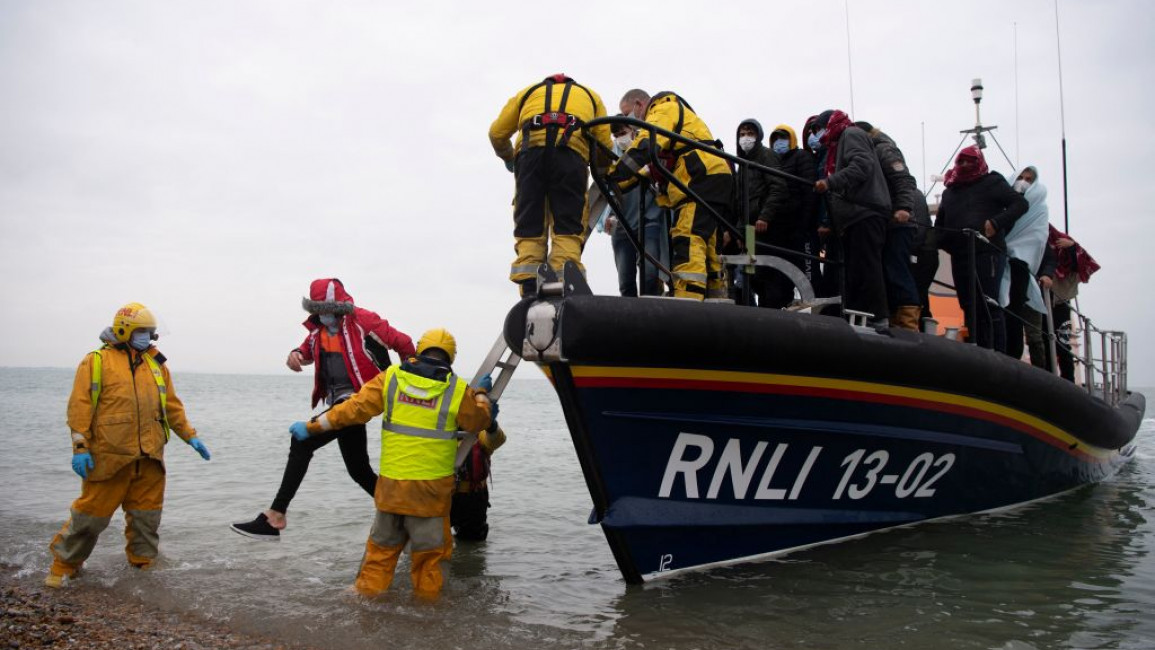UK lifeboat crew subjected to 'horrible' abuse over rescuing people in Channel
A UK lifeboat crew trying to launch a boat into the English Channel and help migrants making the dangerous journey from France were subject to "horrible abuse" by a crowd of spectators, according to a news report last week.
A group of people in Hastings, southern England, tried to block a Royal National Lifeboat Institution (RNLI) boat from going out to sea on 20 November, with the crowd shouting "don't bring any more home, we're full up", a local resident told British radio station LBC.
This incident occurred just days before at least 27 migrants were found dead after attempting to cross the Channel from France to the UK. Many of the victims were Iraqi Kurds, three were minors, and one was a pregnant woman.
The RNLI confirmed with The New Arab that an incident was reported to the police.
"The lifeboat was able to launch and the station remains on service," said the RNLI in a statement.
Zoe, the local resident, told broadcasters: "It was really upsetting, and you could hear the hatred in their voice."
She was on the beach with her boyfriend when she saw a lifeboat crew be prevented from pulling their boat out by a "line" of people.
She described the protesters as "fishermen".
"That's why we stopped our donations," they apparently said.
The New Arab contacted local police for comment over the incident. They did not respond by the time of publication.
The RNLI crew, many of whom are volunteers, have a history of helping migrants who are travelling in small boats across the English Channel.
In one case, a group of 35 men and five teenage boys spent three days at sea in a small dinghy before they were picked up by Hastings RNLI, reported Hastings & St. Leonards Observer.
The charity and its crew have also been slammed by right-wing and far-right pundits for saving people from drowning.
Right-wing populist British broadcaster Nigel Farage claimed the rescue teams were running a "taxi service for migrants".
RNLI has defended its role and rescues.
"I could not be prouder of our amazing volunteer lifeboat crews, who launch to the aid of anyone who is in trouble in or around the water and needs our help. We have done this since the RNLI was founded in 1824 and this will always be our ethos," said RNLI Chief Executive Mark Dowie.
We're proud of the lifesaving work our volunteers do in the Channel – we make no apology for it. Those we rescue are vulnerable people in danger & distress. Each of them is someone’s father, mother, son or daughter - every life is precious. This is why we launch: pic.twitter.com/lORd9NRpdP
— RNLI (@RNLI) July 28, 2021
Since last week's tragic deaths in the Channel, described as "predictable" and "preventable" by refugee charities, the conversation around small boat crossing has dominated headlines in the UK.
Authorities on both sides of the Channel have engaged in a tit-for-tat over who is most to blame for last week's tragedy and who is to blame for the people-smuggling from France to the UK.
However, refugee charities and advocates say the lack of safe routes for asylum seekers should be the main focus. They have called for the expansion of humanitarian corridors to stop people taking perilous boat journeys as well as more compassion from the public and politicians.
A quarter of the British public believes the rise in migrant crossing is because of the French government's handling of the issue, according to YouGov polling data. Instability across the world and a lack of legal ways to get to the UK were the second and third most popular answers to the poll.
The majority of men, women and children who make the dangerous journey across the Channel are refugees fleeing violence, instability and poverty in their home countries.
Around 31,500 people have attempted to cross the Channel since the start of the year, according to French authorities.


![President Pezeshkian has denounced Israel's attacks on Lebanon [Getty]](/sites/default/files/styles/image_684x385/public/2173482924.jpeg?h=a5f2f23a&itok=q3evVtko)



 Follow the Middle East's top stories in English at The New Arab on Google News
Follow the Middle East's top stories in English at The New Arab on Google News


